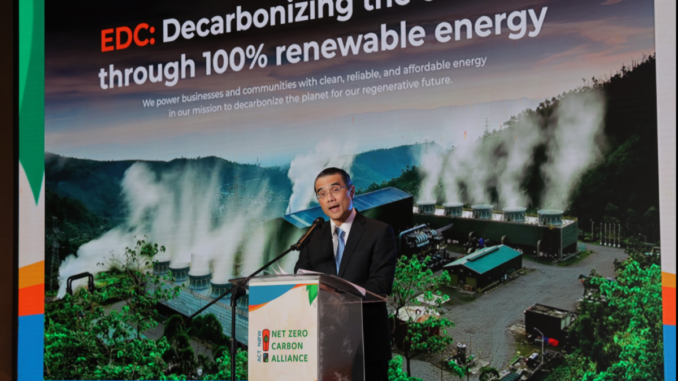
THE Philippines is increasingly at the forefront of discussions on climate change and sustainability, given its unique geographical characteristics, socioeconomic context and vulnerability to climate impacts. As the country aspires to achieve a low-carbon economy, it faces numerous challenges, ranging from economic dependencies to governance issues.
Although the Philippines contributes minimally to global greenhouse gas (GHG) emissions, accounting for just 0.41 percent from 1990 to 2021, it ranks among the lowest per capita emitters in Southeast Asia. The country’s location in the Pacific typhoon belt makes it susceptible to frequent, devastating typhoons and rising sea levels. Recent extreme weather events, including Typhoons Carina, Enteng and Julian, have underscored the nation’s vulnerability and intensified efforts to combat climate change.
Federico Lopez, chairman and chief executive officer of First Philippine Holdings, delivers his keynote address during the First Philippine Net Zero Conference 2024. PHOTO FROM NET ZERO CARBON ALLIANCE
In April 2021, the Philippines submitted its Nationally Determined Contribution (NDC) to the United Nations Framework Convention on Climate Change, committing to reduce its GHG emissions by 75 percent by 2030 compared to a business-as-usual scenario, contingent on international support. This commitment represents a significant step toward recognizing the necessity of transitioning to a more sustainable, low-carbon future. However, achieving net-zero emissions will require overcoming considerable challenges that intertwine economic development, social equity and governance.
In his keynote address during the First Philippine Net Zero Conference 2024 last month at Power Plant Mall, Makati City, Federico Lopez, chairman and chief executive officer of First Philippine Holdings, emphasized that the journey to net zero must occur in three phases. The first is reducing the current level of GHG emissions of 59 gigatons per year and reaching peak emissions by 2025. The second is eliminating all GHG emissions to achieve net zero by 2050, and the third is reducing GHG concentration in the atmosphere to attain net negative emissions.
With the conference theme “Strengthening Resilience: Scaling the Philippine Private Sector’s Net Zero Ambitions,” he further noted that progress toward net zero encompasses many facets beyond energy, including agricultural practices, food production, waste management, building designs, construction materials, industrial processes, deforestation, and more.
Taking an ambitious step
As the global urgency to address climate change intensifies, nations are increasingly setting net-zero targets as part of their climate commitments. The Philippines is highly vulnerable to climate change, facing numerous natural hazards such as typhoons, floods and rising sea levels, all of which have significant humanitarian and economic impacts. This vulnerability has compelled the country to engage in various international climate agreements and frameworks.
Yet, despite these efforts, the Philippines has not declared a formal net-zero target. Among the Asean member states, it is notable for being the only country that has not yet formally committed to a net-zero target.
This reluctance stems from the country’s dependence on fossil fuels and concerns about the economic repercussions of a rapid transition. Latest data from the Department of Energy shows that 76.6 percent of the nation’s power generation relies on coal and gas, highlighting the country’s entrenched reliance on fossil fuels for economic development. The absence of a solid commitment to net-zero emissions underscores the tension between the need for urgent climate action and the demands of economic growth.
However, several indications suggest an increasing readiness to take this ambitious step. The country’s participation in climate dialogues such as those at the Conference of the Parties demonstrates an awareness of the importance of international cooperation on climate initiatives.
Recent government policies, such as the National Adaptation Plan, the NDC Implementation Plan and the GHG Inventory Reports (2015 and 2020) reflect a growing acknowledgment of climate change as a critical issue — which is one of the Marcos administration’s key eight priorities. Latest data from the Climate Change Commission shows that 1,526 out of 1,715 local government units have submitted their Local Climate Change Action Plans, achieving a compliance rate of 88.9 percent, showcasing a rising commitment at the grassroots level.
The recent passage of the proposed Low Carbon Economy Bill by the House of Representatives’ Committee on Climate Change, which aims to boost investments in clean energy projects, along with the push for energy transitions toward solar and wind power, also indicates a shift in thinking about sustainable energy.
The growing influence of civil society organizations and youth groups, particularly Aksyon Klima, has put pressure on the government to establish and commit to clearer climate targets. Recent youth-led climate strikes and advocacy campaigns have heightened awareness of the urgent need for action, positioning younger generations as key catalysts for change.
As Lopez stated, “[T]he ultimate goal is to solve the climate crisis that, by all accounts, is undeniably real and in urgent need of action. We have a narrowing time frame of the next 25 years to make our every action count and avoid irreversible damage to our planet. There is no other way to go but net zero.”
The author is the founder and chief strategic advisor of the Young Environmental Forum and a director of Climate Tracker Asia Inc. He completed a climate change and development course at the University of East Anglia (UK) and an executive program on sustainability leadership at Yale University (USA). You can email at [email protected].


Be the first to comment